
Challenges in Construction Management and Solutions
The world of construction is filled with complexities. From towering skyscrapers to sprawling infrastructure, every project is a massive undertaking involving countless moving parts, tight deadlines, and significant financial investment. At the heart of it all lies construction management, the essential discipline that orchestrates every detail from conception to completion. However, even the most carefully planned projects encounter obstacles. Addressing the challenges in construction project management isn’t just a good practice; it’s critical for survival, profitability, and success in a competitive industry.
This guide will explore the common hurdles that construction professionals face daily. We’ll delve into the causes of project delays, budget overruns, communication breakdowns, and safety concerns. More importantly, we will outline practical solutions, from advanced planning strategies to the implementation of powerful construction project management software, to help you navigate these challenges effectively.
Understanding Construction Management
Before we can tackle the problems, we must first grasp the fundamentals of the field. What exactly is construction management, and why is it so indispensable? So, construction management is a professional service that uses specialized project management techniques to oversee the planning, design, and construction of a project from start to finish. The primary construction management definition involves controlling a project’s time, cost, quality, and safety. It’s about bringing a client’s vision to life while adhering to strict parameters.
The construction management meaning extends beyond simple supervision. It’s a holistic approach that integrates all facets of a project. This includes coordinating architects, engineers, contractors, and suppliers to ensure everyone works toward a unified goal. The ultimate objective is to deliver a finished project that meets the client’s expectations on schedule and within budget.
Importance of Construction Management in Projects
Effective construction business management software is the backbone of any successful build. It provides the structure and leadership needed to navigate the project lifecycle. A general construction manager or a building and construction manager acts as the client’s primary advocate, making crucial decisions and solving problems as they arise.
So, what does a construction manager do? Their responsibilities are vast and varied. They include:
- Developing detailed project plans and schedules.
- Estimating costs and managing the budget.
- Selecting and hiring subcontractors and workers.
- Ensuring compliance with building codes, legal regulations, and safety standards.
- Facilitating communication among all project stakeholders.
- Monitoring progress and reporting on project status.
Without a dedicated management team, a project can quickly descend into chaos, leading to the very challenges we aim to avoid.
Common Challenges Faced in Construction Management

Despite the best intentions, construction projects are prone to a unique set of challenges. Understanding these issues is the first step toward overcoming them.
Delays in Project Timelines
Project delays are one of the most frequent and frustrating problems in the industry. They can stem from numerous sources, including unexpected site conditions, poor weather, supply chain disruptions, labor shortages, and scope changes. These delays don’t just push back completion dates; they also inflate costs and can damage a company’s reputation. The construction manager’s office is the central hub for anticipating these risks and developing contingency plans to mitigate their impact.
Budget Overruns
Closely linked to delays are budget overruns. When a project takes longer than expected, labor and equipment rental costs accumulate. Other causes of financial strain include inaccurate initial estimates, fluctuating material prices, and unforeseen design changes. For any construction management business, maintaining financial control is paramount. Without meticulous financial planning and tracking, a profitable project can quickly turn into a significant loss.
Communication Barriers
A construction site is a complex web of stakeholders: clients, designers, contractors, subcontractors, and suppliers. When communication falters, the entire project suffers. Misunderstandings can lead to errors, rework, and disputes. Ineffective building site management often results from poor information flow, where critical updates fail to reach the right people at the right time. These communication barriers create friction and hinder collaboration, undermining team cohesion and productivity.
Safety Issues at the Construction Site
Construction remains one of the most hazardous industries. Common safety risks include falls from height, electrocution, machinery accidents, and exposure to hazardous materials. A single accident can have devastating human consequences, halt work indefinitely, and lead to costly legal battles and fines. The question, “What does a construction department manager do?” is often best answered by highlighting their vital role in ensuring safety. They are responsible for implementing safety protocols and promoting a culture of safety awareness throughout the entire construction site.
Effective Solutions to Address Challenges
Recognizing the challenges is one half of the battle. The other half is implementing effective solutions to manage and overcome them.
Implementing Robust Planning Strategies
The old adage “fail to plan, plan to fail” is especially true in construction. Detailed, front-end planning is the most effective defense against delays and budget overruns. A construction GM (general manager) must lead the effort to create a comprehensive project plan that outlines every phase, task, dependency, and milestone. This involves conducting thorough site investigations, creating realistic timelines, and developing accurate cost estimates. A robust plan acts as a roadmap, guiding the project and providing a baseline against which to measure progress.
Utilizing Technology in Construction Management
Modern problems require modern solutions. Technology, specifically construction project management software, has become a game-changer for the industry. These powerful platforms centralize all project information, from blueprints and documents to schedules and budgets.
Here’s how technology helps:
- Addressing Delays: Software provides real-time scheduling tools, enabling managers to track progress, identify potential bottlenecks early, and adjust plans proactively.
- Controlling Budgets: Integrated cost management features allow for real-time budget tracking, expense reporting, and financial forecasting, preventing overruns.
- Improving Communication: Cloud-based platforms create a single source of truth, ensuring all stakeholders have access to the latest information, which breaks down communication silos.
Enhancing Communication Among Stakeholders
Beyond technology, fostering a culture of open communication is essential. Regular meetings, clear reporting structures, and established communication channels are vital for successful construction management construction. The building and construction manager should facilitate collaboration, ensuring that the client’s vision is clearly understood by the on-site teams and that feedback from the field is relayed back to the office. When everyone is aligned and informed, problems are solved faster, and mistakes are minimized.
Importance of Training and Safety Protocols
A safe site is a productive site. Investing in comprehensive safety training programs for all workers is non-negotiable. These programs should cover hazard identification, proper equipment use, and emergency procedures. Enforcing strict safety protocols, such as requiring personal protective equipment (PPE) and conducting regular site inspections, is fundamental to building site management. A strong safety culture, championed by the construction department manager, not only protects workers but also reduces project downtime and liability.
Case Studies
Theoretical solutions are valuable, but real-world examples demonstrate their true impact.
Successful Project Management in Overcoming Delays
A large commercial development project was facing significant delays due to unexpected subsurface rock formations discovered during excavation. The project team used their construction project management software to quickly re-sequence the schedule, reallocating resources to other areas of the site while the excavation issue was addressed. The software’s real-time collaboration tools allowed them to instantly communicate the revised plan to all subcontractors, preventing a complete work stoppage and minimizing the overall impact on the final delivery date.
Budget Management Success Stories
A general contractor undertaking a multi-family housing project used their management software to track every expense against the original budget in real time. When the price of lumber unexpectedly surged, the system immediately flagged the variance. The construction gm was able to use this data to quickly negotiate with alternative suppliers and present the client with value engineering options to offset the increased cost. As a result, the project was completed within 1% of the original budget, a major success for the construction management business.
Conclusion
Construction management challenges persist, but the solutions are evolving through technology. The industry’s future lies in tools like Artificial Intelligence (AI) for predictive analytics, drones for accurate site surveys, and Building Information Modeling (BIM) for 3D visualization. Advanced project management software now serves as the central hub, integrating data for better insight and control. To stay competitive, construction companies must embrace innovation—combining strategic technology use, clear communication, sound planning, and a strong safety culture. Overcoming challenges is no longer just about completing projects; it’s about building a smarter, more resilient, and future-ready construction business.
Frequently Asked Questions
Key challenges include project delays, budget overruns, miscommunication among stakeholders, and maintaining safety standards—all of which affect timelines, profitability, and overall project success.
Construction project management software acts as a central hub for all project information. It offers real-time scheduling, tracks expenses, and improves communication, ensuring smoother coordination, reduced delays, and greater control over project outcomes.
A construction manager plans, budgets, hires contractors, ensures safety and compliance, and acts as the communication link between clients, teams, and on-site workers.
Establish clear communication channels, hold regular progress meetings, and encourage collaboration between teams to ensure seamless information flow and prevent costly misunderstandings.
Safety prevents injuries, reduces downtime, and minimizes legal risks. Strong safety leadership ensures compliance, protects workers, and supports a productive, efficient construction environment.




